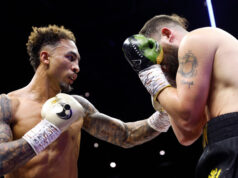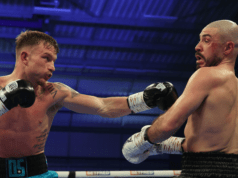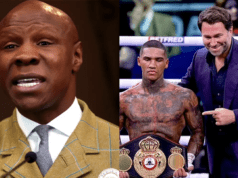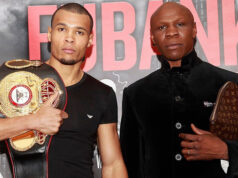Showtime’s Super Six Boxing Classic was a brilliant idea that excited the entire boxing community, promising as it did more than a dozen high quality match-ups between the best super middleweights in the world. Through the first year of the tournament, the Super Six delivered on its promise. Every fight was entertaining, and the tournament as a whole provided upsets, complaints of hometown judging, and all the other drama that accompanies world-class boxing. Yet all along, I have harbored reservations that somehow the Super Six was not meant to last. The first major cracks appeared when Mikkel Kessler bailed out with an eye injury. Now Carl Froch has bailed on his scheduled match-up with Arthur Abraham, citing a back injury.
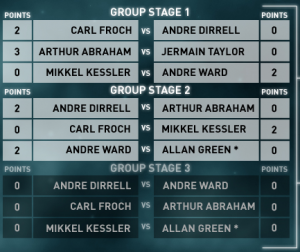 Hopefully, Froch vs. Abraham will only be postponed, but Froch’s posturing over the fight venue gives me real cause to doubt that. Froch seemed to be on the verge of leaving the tournament altogether rather than fight the tournament’s chief knockout artist, and might be seizing on Kessler’s withdrawal as cover for his own retreat. However, Kessler and Froch both illustrate why a tournament with the round-robin format of the Super Six was doomed from the start.
Hopefully, Froch vs. Abraham will only be postponed, but Froch’s posturing over the fight venue gives me real cause to doubt that. Froch seemed to be on the verge of leaving the tournament altogether rather than fight the tournament’s chief knockout artist, and might be seizing on Kessler’s withdrawal as cover for his own retreat. However, Kessler and Froch both illustrate why a tournament with the round-robin format of the Super Six was doomed from the start.
Boxing is not like other sports for two reasons. First, each and every boxer is essentially a private enterprise in his own right. In most cases, that enterprise is contracted out to a promoter, but at the end of the day every boxer is responsible for his own success. If Carl Froch is looking for an way out of his match-up with Abraham, it is because in his private moments he does not think he can win and fears what a big loss might do to his career. There is no world boxing league forcing Froch to square off with Abraham to advance his career. Hypothetically, Froch could at least try to ditch the tournament, bear the ignominy for causing it to collapse, and work his way around it all.
Pugilism is also unlike many other sports in the respect that an injury puts the entire operation out of commission. Team sports never hinge on the health of a single player. Even with other single player sports, such as tennis and golf, an injury is not so critical because there are several major events held throughout the year. Missing one has little impact on the individual player, nevermind the sport as a whole. World-class boxers, however, often fight only twice a year, with four times a year constituting a very busy schedule. If Froch really did hurt his back, it means he won’t be ready to fight again until the end of this year at the earliest. He might fight only once in 2010.
With the most individualistic kind of free agency at work and the possibility of a fight- or gym-incurred injury delaying things, a tournament that operates on a round-robin basis will always collapse under its own weight unless it moves quickly. Maybe in the era of Joe Louis or Sugar Ray Robinson, when even a top-ranked boxer might fight once or even twice a month, this format could have worked. However, time is the enemy of a format like the Super Six’s group stage, and in that light the withdrawal of half the original roster was almost inevitable. Boxing is not like the World Cup, and for that reason I doubt we will ever see the Super Six format repeated. It was a daring concept, but only an elimination tournament can move fast enough to ensure speedy, hiccup-free conclusion. The tournament has been worth it, but boxing fans everywhere will be very lucky if it ultimately crowns a winner.


